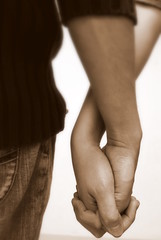 Romance isn’t my favorite genre. I prefer spacemen and spooks, dryads and detectives to heaving bosoms and clandestine love letters. But science fiction or noir or some such similar story wouldn't have really been appropriate for Valentines Day, so my wife and I picked up Bright Star last weekend, Australian director Jane Campion's recounting of poet John Keats' relationship with fashion student Fanny Brawne. The fact that Keats' work (in my humble opinion) beats that of his contemporaries with a stick mollified my genre trepidation, and upon watching I found the film immensely enjoyable. It's a quiet, understated piece whose leads share a potent sexual attraction -- without ever actually having sex.
Romance isn’t my favorite genre. I prefer spacemen and spooks, dryads and detectives to heaving bosoms and clandestine love letters. But science fiction or noir or some such similar story wouldn't have really been appropriate for Valentines Day, so my wife and I picked up Bright Star last weekend, Australian director Jane Campion's recounting of poet John Keats' relationship with fashion student Fanny Brawne. The fact that Keats' work (in my humble opinion) beats that of his contemporaries with a stick mollified my genre trepidation, and upon watching I found the film immensely enjoyable. It's a quiet, understated piece whose leads share a potent sexual attraction -- without ever actually having sex.Not that connubial pleasure is completely off the radar as in those Masterpiece Theater period dramas. Brawne and Keats' mutual attraction is evident to many more than just themselves. "You are already the source of so much gossip," Fanny's mother chides when she suggests a scheme to help the tubercular poet. After Keats falls ill, his friend Charles Brown sarcastically suggests, "Why not bed her? She'd do whatever you wished. It might relieve your condition." (Brown himself has no qualms about impregnating an illiterate Irish maid or suggesting that she should learn to read the Bible because "in the Songs of Solomon there are some bits so juicy they make even a churchman blush.") Brawne privately admits her own willingness to yield right before Keats' trip to Italy that ultimately claims his life. "You know I would do anything," she murmurs. His response? "I have a conscience."
James Bownman, author of Honor: A History, argues that such denial cranks up romance's thermostat. "It was the nearness of human happiness to irrevocable loss and tragedy that made the achievement of love, when it came, so exciting," he writes in The Wall Street Journal. "It is the absence, in our hook-up culture, of the sense that anything very much is at stake in love that makes our romantic comedies so feeble." In other words, sex becomes sexy in our stories when treated seriously, as though it has real import. It certainly works in Bright Star. Lingering close ups of Brawne and Keats' hands twining and untwining, lingering and caressing bring a surprising amount of heat. In fact, in that moment they seem like some of the sexiest things in the world.
(Picture: CC 2009 by ABEE_T)


8 comments:
I read the write up on this in the NY Times Art section a few months ago and wanted to see it but wondered if it would fall into the 'period romance that wants to be Jane Austen' category.
Keats over Coleridge? Huh. I can understand Wordsworth and Shelley, though.
Andrew Klavan could not agree less: http://www.andrewklavan.com/2010/02/17/dull-bright-star/
B.,
Bright Star feels ... really different from the Austen-esque films. It's quiet and subtle and very, very beautiful. "Dreamy" is probably the right word. Definitely not a Hollywood movie.
Coleridge is great, but I find Keats much more accessible. A professor described him as the poet he'd stay up late into the night reading. I'd second that.
Lars,
Man, I hate being on the opposite side of Klavan, because he's so much more awesome than me on most every count. It's fair to say the film is slow and doesn't feature Keats as the main character. (Brawne really is the focus.) But I didn't see the proto-feminist messages he found in it. In fact, I was shocked at how conservatively it handled sex and love.
NEWSWEEK had a feature on biopics this week--how hard it is to do a good one. This was a very good one. I think it captures his poetry very well.
I love the bit where Mrs. Brawne asks Keats to read a poem at the end of dinner, and he starts in with "When I have fears that I may cease to be," then stops partway through because he realizes how out-of-place it is.
Hi I loved "Bright Star" I made a picture of Fanny in the meadow with blue and purple flowers. cheers and "Happy days" Marie
It really was a visually lovely film, wasn't it? I particularly enjoyed all the symbolism with the butterflies in Brawne's room.
Post a Comment